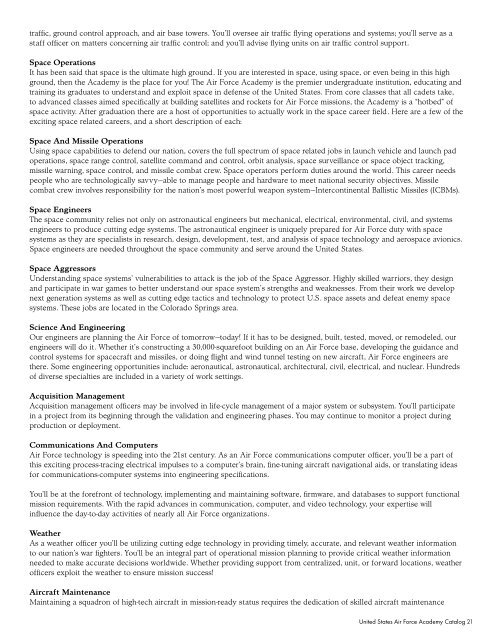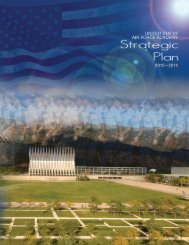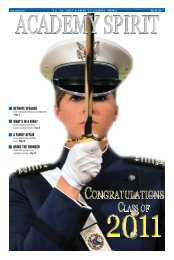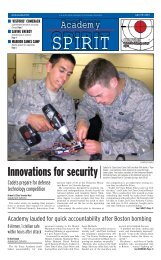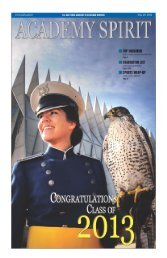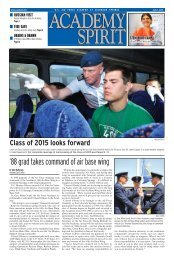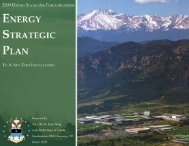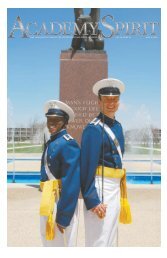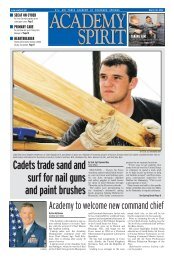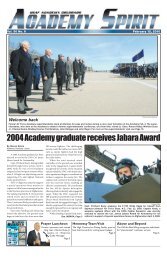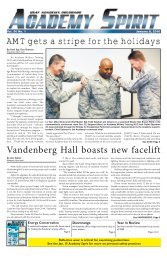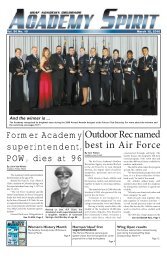2008-2009 Catalog - United States Air Force Academy
2008-2009 Catalog - United States Air Force Academy
2008-2009 Catalog - United States Air Force Academy
Create successful ePaper yourself
Turn your PDF publications into a flip-book with our unique Google optimized e-Paper software.
traffic, ground control approach, and air base towers. You’ll oversee air traffic flying operations and systems; you’ll serve as a<br />
staff officer on matters concerning air traffic control; and you’ll advise flying units on air traffic control support.<br />
Space Operations<br />
It has been said that space is the ultimate high ground. If you are interested in space, using space, or even being in this high<br />
ground, then the <strong>Academy</strong> is the place for you! The <strong>Air</strong> <strong>Force</strong> <strong>Academy</strong> is the premier undergraduate institution, educating and<br />
training its graduates to understand and exploit space in defense of the <strong>United</strong> <strong>States</strong>. From core classes that all cadets take,<br />
to advanced classes aimed specifically at building satellites and rockets for <strong>Air</strong> <strong>Force</strong> missions, the <strong>Academy</strong> is a “hotbed” of<br />
space activity. After graduation there are a host of opportunities to actually work in the space career field. Here are a few of the<br />
exciting space related careers, and a short description of each:<br />
Space And Missile Operations<br />
Using space capabilities to defend our nation, covers the full spectrum of space related jobs in launch vehicle and launch pad<br />
operations, space range control, satellite command and control, orbit analysis, space surveillance or space object tracking,<br />
missile warning, space control, and missile combat crew. Space operators perform duties around the world. This career needs<br />
people who are technologically savvy—able to manage people and hardware to meet national security objectives. Missile<br />
combat crew involves responsibility for the nation’s most powerful weapon system—Intercontinental Ballistic Missiles (ICBMs).<br />
Space Engineers<br />
The space community relies not only on astronautical engineers but mechanical, electrical, environmental, civil, and systems<br />
engineers to produce cutting edge systems. The astronautical engineer is uniquely prepared for <strong>Air</strong> <strong>Force</strong> duty with space<br />
systems as they are specialists in research, design, development, test, and analysis of space technology and aerospace avionics.<br />
Space engineers are needed throughout the space community and serve around the <strong>United</strong> <strong>States</strong>.<br />
Space Aggressors<br />
Understanding space systems’ vulnerabilities to attack is the job of the Space Aggressor. Highly skilled warriors, they design<br />
and participate in war games to better understand our space system’s strengths and weaknesses. From their work we develop<br />
next generation systems as well as cutting edge tactics and technology to protect U.S. space assets and defeat enemy space<br />
systems. These jobs are located in the Colorado Springs area.<br />
Science And Engineering<br />
Our engineers are planning the <strong>Air</strong> <strong>Force</strong> of tomorrow—today! If it has to be designed, built, tested, moved, or remodeled, our<br />
engineers will do it. Whether it’s constructing a 30,000-squarefoot building on an <strong>Air</strong> <strong>Force</strong> base, developing the guidance and<br />
control systems for spacecraft and missiles, or doing flight and wind tunnel testing on new aircraft, <strong>Air</strong> <strong>Force</strong> engineers are<br />
there. Some engineering opportunities include: aeronautical, astronautical, architectural, civil, electrical, and nuclear. Hundreds<br />
of diverse specialties are included in a variety of work settings.<br />
Acquisition Management<br />
Acquisition management officers may be involved in life-cycle management of a major system or subsystem. You’ll participate<br />
in a project from its beginning through the validation and engineering phases. You may continue to monitor a project during<br />
production or deployment.<br />
Communications And Computers<br />
<strong>Air</strong> <strong>Force</strong> technology is speeding into the 21st century. As an <strong>Air</strong> <strong>Force</strong> communications computer officer, you’ll be a part of<br />
this exciting process-tracing electrical impulses to a computer’s brain, fine-tuning aircraft navigational aids, or translating ideas<br />
for communications-computer systems into engineering specifications.<br />
You’ll be at the forefront of technology, implementing and maintaining software, firmware, and databases to support functional<br />
mission requirements. With the rapid advances in communication, computer, and video technology, your expertise will<br />
influence the day-to-day activities of nearly all <strong>Air</strong> <strong>Force</strong> organizations.<br />
Weather<br />
As a weather officer you’ll be utilizing cutting edge technology in providing timely, accurate, and relevant weather information<br />
to our nation’s war fighters. You’ll be an integral part of operational mission planning to provide critical weather information<br />
needed to make accurate decisions worldwide. Whether providing support from centralized, unit, or forward locations, weather<br />
officers exploit the weather to ensure mission success!<br />
<strong>Air</strong>craft Maintenance<br />
Maintaining a squadron of high-tech aircraft in mission-ready status requires the dedication of skilled aircraft maintenance<br />
<strong>United</strong> <strong>States</strong> <strong>Air</strong> <strong>Force</strong> <strong>Academy</strong> <strong>Catalog</strong> 21


